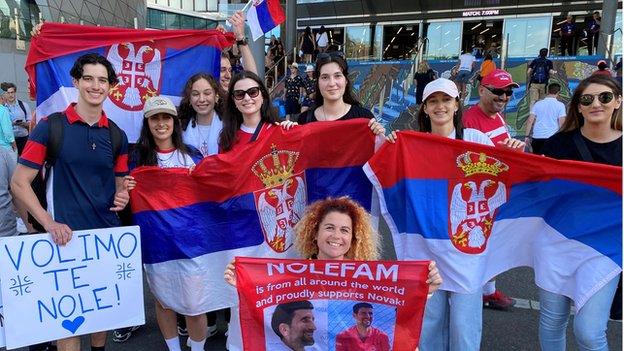Australian Open: Novak Djokovic receives warm welcome on Melbourne return
Novak Djokovic received an adoring welcome on his first public return to the Australian Open for a practice match with home favourite Nick Kyrgios.
The 35-year-old Serb was deported before last year’s tournament after a row about his Covid-19 vaccination status that divided public opinion.
“I’m very happy. Thank you so much,” said Djokovic after walking on to Rod Laver Arena to a rapturous reception.
“I feel a bit emotional. I was looking forward to coming back to this court.”
Djokovic returned to Australia last week and received a warm welcome when he played in Adelaide, where he won the ATP 250 event.
But there was fascination regarding how he would be received back in Melbourne, which endured some of the toughest coronavirus lockdowns in the world.
In a city with a huge Serb population, hundreds wore the Balkan nation’s colours as Djokovic stepped out there for the first time since 2020.
Earlier this week, Australian Open tournament director Craig Tiley asked fans to be respectful, warning they would be kicked out of Melbourne Park if they booed Djokovic.
The former world number one’s name was greeted with loud cheers when it was read out – drowning out a couple of boos – before he entered the court.
Only a deafening roar could be heard as he walked on to the court, where the nine-time champion has enjoyed some of his biggest successes.

The warm-up event raised money for charity, with the 15,000-capacity Rod Laver Arena selling out in 58 minutes when tickets were released on Tuesday.
Djokovic, going for a record-extending 10th title and record-equalling 22nd men’s major, has been managing a hamstring injury but said before the exhibition he was “feeling good”.
He and Kyrgios shared two sets, which were the first-to-four points, and which offered little insight into their Australian Open preparations.
The pair were joined on court by wheelchair players David Wagner and Heath Davidson, and then two junior players, in a deciding tie-break which Team Kyrgios won.
“It feels great to be back in Australia and back in Melbourne. It is the court where I created the best memories of my tennis career,” said Djokovic, who plays his first-round match against Spain’s Roberto Carballes Baena on Tuesday.
How do Melburnians feel a year on?
Djokovic was not allowed to play at the opening Grand Slam of the season last year after 11 dramatic and chaotic days, which ended in his deportation from Australia.
He had not been vaccinated against Covid-19 but was given a medical exemption to play.
The announcement sparked some public outrage, leading to accusations Djokovic had been given preferential treatment.
But there was also anger at the way he was treated by the Australian government, especially after he was detained on arrival in Melbourne.
In November, the path was cleared for Djokovic to play in this year’s Australian Open when the Australian government overturned his visa ban.
A year on, opinion was still split about Djokovic’s treatment among some of those arriving at Rod Laver Arena on Friday.
“I thought the anger about him coming here was justified,” said Melbourne resident Jen Sykes. Her son Alastair felt the whole saga was “more a failure of the government”, which was under the premiership of Scott Morrison at the time.
Serbia-born Milan Ljubinovic, who lives in Melbourne and has been in Australia for almost 25 years, said his view still remained that Djokovic had been treated unfairly.
“Novak did what they told him; they told him he could come and play even though he was not vaccinated,” he said.
How 11 days of chaos unfolded last year
4 January: The Serb announced on social media he had been given a medical exemption, granted by two independent medical panels organised by Tennis Australia and Victoria state, to enter the country and play at the Australian Open.
5 January: In a dramatic move, Djokovic had his visa cancelled when he landed at Melbourne’s Tullamarine airport and he was detained by the Australian Border Force in an immigration hotel.
6 January: Serbia’s president Aleksander Vucic accused Australia of “harassing” Djokovic – a claim denied by the national government – and Djokovic’s family said the player was being treated like “a terrorist in Guantanamo Bay”.
10 January: The decision to cancel Djokovic’s visa was overturned on procedural grounds and he was released from the detention hotel.
14 January: Australia immigration minister Alex Hawke cancelled Djokovic’s visa again, saying it was in the public interest because he could inspire anti-vaccine sentiments.
16 January: A three-judge panel refused to overturn the decision in another court challenge by Djokovic, who was forced to leave the country.



